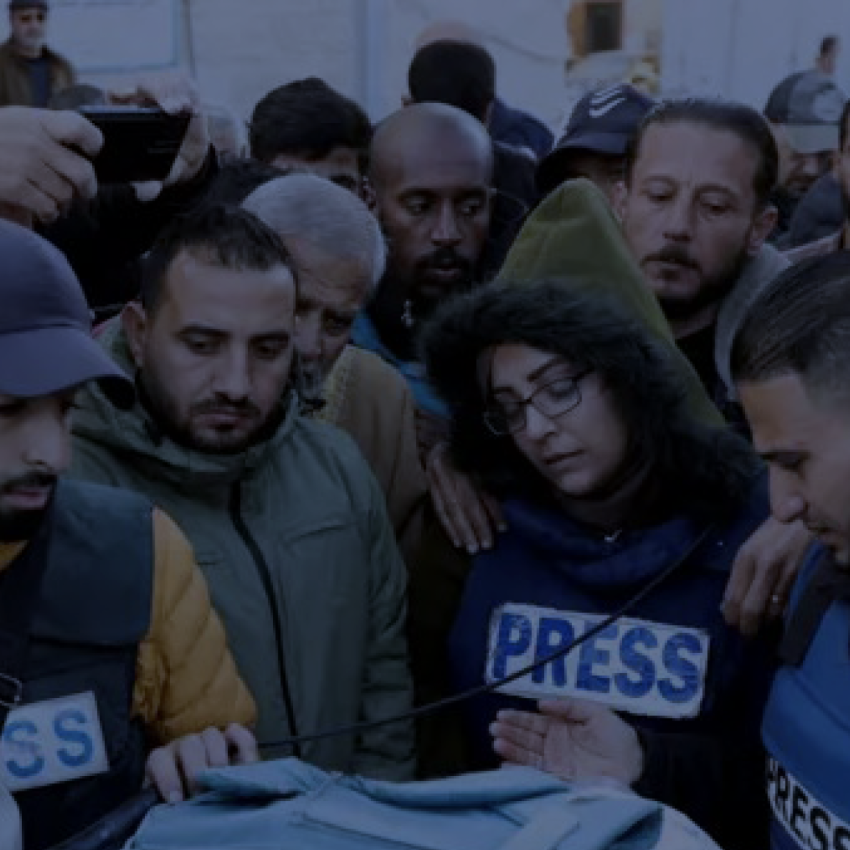
Four journalists, four correspondents, and seven photographers were killed, while nine others were wounded, in Israeli strikes on the Gaza Strip. Other violations targeted 17 journalists in the West Bank and Jerusalem. Meanwhile, a Syrian media activist was found hanged in his home in Deir Ezzor, with signs of torture on his body, and a journalist was killed when an Israeli drone struck his car in Lebanon. Journalists in Lebanon also faced summonses, legal complaints, smear campaigns, and threats – extended to their families as well – while in Jordan, reporters were subjected to arrests, summonses, and prosecution.
Below is a detailed summary of the violations monitored by the Samir Kassir Foundation’s SKeyes Center for Media and Cultural Freedom in Lebanon, Palestine, Syria, and Jordan.
In Lebanon, the director of the Hawana Lebanon website, Mohammad Shehadeh, was killed in an Israeli drone strike that targeted his car on the Zahrani road in southern Lebanon (08/08). Journalist Rami Naïm was subjected to a smear campaign and death threats (08/11), while the family members of Asas Media managing editor Mohammad Barakat faced harassment because of the journalist’s anti-Hezbollah political views (08/15). The Anti-Cybercrime and Intellectual Property Rights Bureau summoned journalist Yvone Anwar Souaibi, editor-in-chief of Al-Khabar online newspaper, following a complaint filed by the Lebanese Association of Certified Public Accountants over several articles; she refused to comply with the summons (08/22). MP Bilal Abdallah filed a complaint with the Criminal Investigations Bureau against Al-Hurra online newspaper managing editor Carine Abdelnour over an article (08/25). The municipality of Sidon lodged a similar complaint with the South’s public prosecutor against the Al-Post website, accusing it of “inciting sectarian strife” (08/22). Meanwhile, Meta suspended the Facebook and Instagram accounts of comedian Shaden Fakih without providing any explanation (08/05).
In the Gaza Strip, Israeli forces continued to commit atrocities against civilians, including journalists, photographers, and their families. Several were killed: Al-Jazeera reporters Anas Al-Sharif and Mohamed Qreiqeh; videographers Ibrahim Zaher and Mohammad Noufal (08/10); Mohammad Salama (08/25); Reuters photographer Hossam El-Masri (08/25); Independent Arabia photographer Mariam Abu Daqa (08/25); freelance photographers Moamen Aliwa (08/10) and Moaz Abu Taha; Quds Feed Network reporter Ahmad Abu Aziz (08/25); Al-Quds Today reporter Islam Abed (08/31); academic and Al-Hayat Al-Jadida journalist Hassan Douhan (08/25); and freelance journalists Mohammad Al-Khalidi (08/10), Islam El-Koumi (08/18), and Iman El-Zamili (08/31). Others were injured in Israeli airstrikes: media activist Abdul-Rahman Battah (08/02); Alkofiya channel reporter Mohamed Sobeh (08/10); freelance journalists Ahmed Al-Harazin (08/10) and Rami Abu Zubayda (08/26); Palestine TV videographer Jamal Badah (08/25); Reuters photographer Hatem Omar (08/25); and freelance photographers Mohamed Qeita (08/10), Mohamed Fayek (08/25), and Fayez Qreiqeh (08/31).
In the West Bank, Israeli forces beat Associated Press photographer Imad Issaid (08/26), and targeted Al-Ghad Al-Arabi correspondent Diaa Hoshiyah and Anadolu Agency photographer Hisham Abu Shaqra with stun and teargas grenades (08/26). On the same day, freelance journalists Sidqi Ayyoub Rayan and Abdullah Tayseer Bahesh, Roya TV correspondent Hafez Abu Sabra, Al-Fajr TV reporter Sajida Bani Shamsa, SIPA agency photographer Nasser Shtayyeh, and Al-Jazeera cameraman Fadi Yassin were also attacked (08/27). An Israeli military vehicle attempted to run over Abu Shaqra and Hoshiyah (08/26), while Deutsche Welle correspondent Rajai Khateeb was prevented from covering events (08/26). Israeli forces also arrested Palestine TV correspondent Badr Abu Najm and cameraman Saud Hayel (08/16), freelance photographer Muath Amarna (08/20), and freelance journalist Osaid Amarna (08/27), each reporting in different areas.
Separately, Palestinian intelligence forces arrested Alkofiya TV correspondent Mazen Awad after raiding his home. The Nablus Magistrate’s Court extended his detention for 15 days pending investigation on charges of “possessing a firearm and receiving funds from illegal sources” (08/19).
In the 1948 Territories, Israeli police arrested Al-Jarmaq website correspondent Sireen Jabbareen, holding her for three hours and questioning her in Haifa (08/14). They also arrested Al-Nas Radio correspondent Dia’ Hajj Yahya and Kul Al-Arab website correspondent Hassan Shaalan for one hour in Kafr Qassem (08/24).
In Syria, the death of media activist Kindi Al-Adai, found hanged in his apartment in Deir Ezzor’s Al-Joura neighborhood, shocked media and cultural circles in August 2025, especially as signs of torture were found on his body. Authorities announced a week later that they had arrested the perpetrators, though no motives were disclosed (08/10). Al-Adai had returned from Germany less than a month earlier.
In Jordan, intelligence forces arrested director Ahmad Al-Ramahi without providing any reason (08/20). The Cybercrime Unit summoned journalist Mohammad Al-Aananzeh over a defamation complaint filed by a youth center director regarding a social media post (08/25). The Jordan Press Association submitted to the Amman Public Prosecutor a list of 33 individuals accused of practicing journalism illegally without the required legal status (08/07). Meanwhile, the Jordan News Agency-Petra published a false report claiming that Al-Sabeel newspaper had been shut down “due to its ties with the now-dissolved Muslim Brotherhood” (08/02).